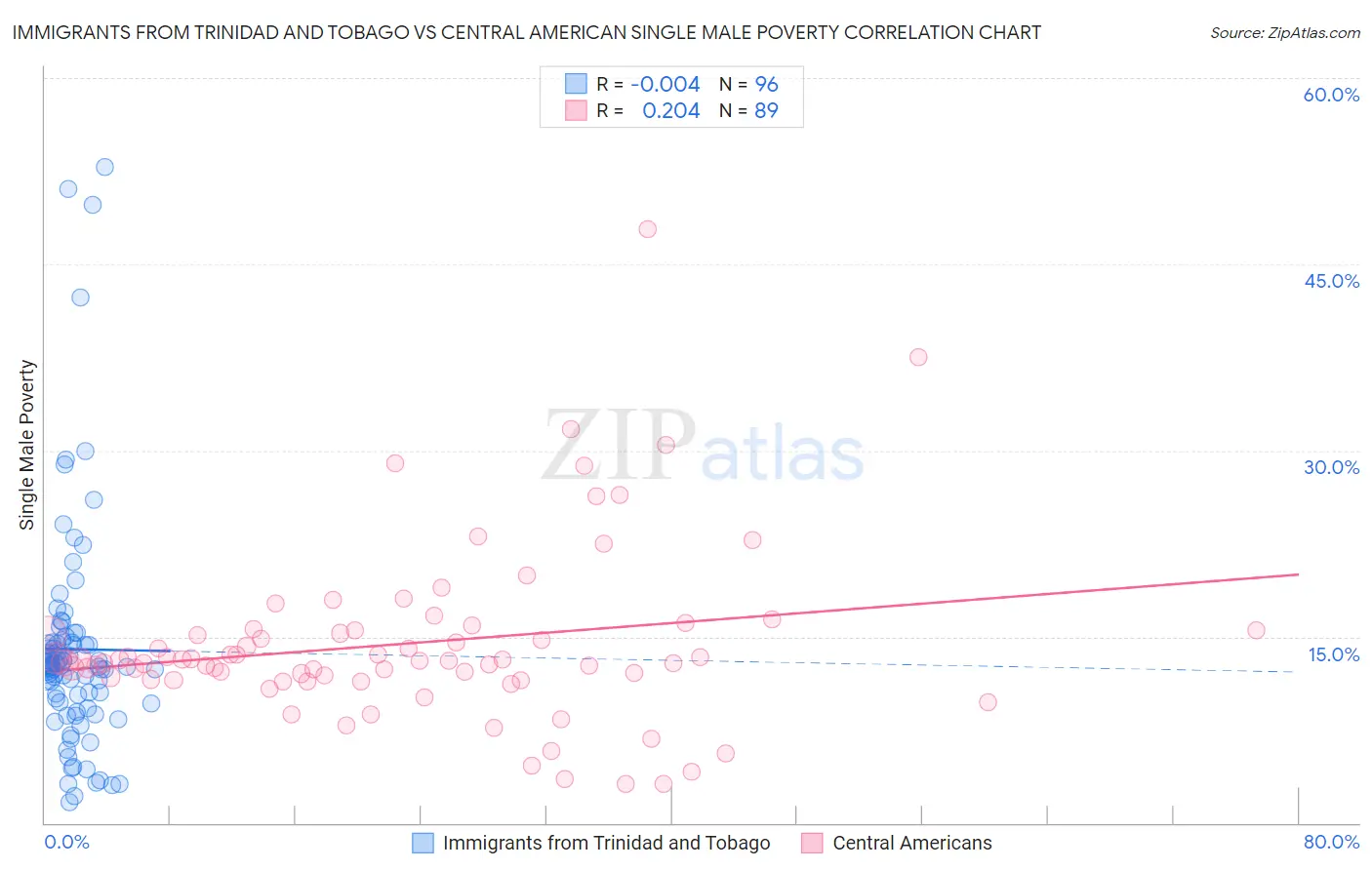Immigrants from Trinidad and Tobago vs Central American Single Male Poverty
COMPARE
Immigrants from Trinidad and Tobago
Central American
Single Male Poverty
Single Male Poverty Comparison
Immigrants from Trinidad and Tobago
Central Americans
12.9%
SINGLE MALE POVERTY
32.5/ 100
METRIC RATING
184th/ 347
METRIC RANK
13.2%
SINGLE MALE POVERTY
10.9/ 100
METRIC RATING
220th/ 347
METRIC RANK
Immigrants from Trinidad and Tobago vs Central American Single Male Poverty Correlation Chart
The statistical analysis conducted on geographies consisting of 206,843,036 people shows no correlation between the proportion of Immigrants from Trinidad and Tobago and poverty level among single males in the United States with a correlation coefficient (R) of -0.004 and weighted average of 12.9%. Similarly, the statistical analysis conducted on geographies consisting of 436,047,555 people shows a weak positive correlation between the proportion of Central Americans and poverty level among single males in the United States with a correlation coefficient (R) of 0.204 and weighted average of 13.2%, a difference of 1.8%.

Single Male Poverty Correlation Summary
| Measurement | Immigrants from Trinidad and Tobago | Central American |
| Minimum | 1.7% | 3.1% |
| Maximum | 52.8% | 47.8% |
| Range | 51.1% | 44.7% |
| Mean | 14.0% | 14.5% |
| Median | 12.6% | 13.1% |
| Interquartile 25% (IQ1) | 9.7% | 11.5% |
| Interquartile 75% (IQ3) | 14.5% | 15.5% |
| Interquartile Range (IQR) | 4.9% | 4.0% |
| Standard Deviation (Sample) | 9.2% | 7.1% |
| Standard Deviation (Population) | 9.2% | 7.0% |
Similar Demographics by Single Male Poverty
Demographics Similar to Immigrants from Trinidad and Tobago by Single Male Poverty
In terms of single male poverty, the demographic groups most similar to Immigrants from Trinidad and Tobago are Immigrants from West Indies (12.9%, a difference of 0.030%), Norwegian (12.9%, a difference of 0.030%), Nigerian (12.9%, a difference of 0.030%), Immigrants from Kuwait (12.9%, a difference of 0.040%), and Macedonian (12.9%, a difference of 0.060%).
| Demographics | Rating | Rank | Single Male Poverty |
| Immigrants | Canada | 44.8 /100 | #177 | Average 12.8% |
| Immigrants | Switzerland | 43.1 /100 | #178 | Average 12.8% |
| Israelis | 41.0 /100 | #179 | Average 12.9% |
| Immigrants | North America | 37.7 /100 | #180 | Fair 12.9% |
| Panamanians | 37.6 /100 | #181 | Fair 12.9% |
| Moroccans | 36.8 /100 | #182 | Fair 12.9% |
| Immigrants | West Indies | 33.0 /100 | #183 | Fair 12.9% |
| Immigrants | Trinidad and Tobago | 32.5 /100 | #184 | Fair 12.9% |
| Norwegians | 32.0 /100 | #185 | Fair 12.9% |
| Nigerians | 31.9 /100 | #186 | Fair 12.9% |
| Immigrants | Kuwait | 31.9 /100 | #187 | Fair 12.9% |
| Macedonians | 31.5 /100 | #188 | Fair 12.9% |
| Portuguese | 30.2 /100 | #189 | Fair 12.9% |
| Arabs | 27.0 /100 | #190 | Fair 13.0% |
| Immigrants | Thailand | 26.6 /100 | #191 | Fair 13.0% |
Demographics Similar to Central Americans by Single Male Poverty
In terms of single male poverty, the demographic groups most similar to Central Americans are New Zealander (13.2%, a difference of 0.020%), Immigrants from Western Europe (13.2%, a difference of 0.11%), Immigrants from Burma/Myanmar (13.1%, a difference of 0.22%), Immigrants from the Azores (13.2%, a difference of 0.23%), and Scandinavian (13.1%, a difference of 0.25%).
| Demographics | Rating | Rank | Single Male Poverty |
| Italians | 15.9 /100 | #213 | Poor 13.1% |
| Zimbabweans | 14.9 /100 | #214 | Poor 13.1% |
| Japanese | 14.8 /100 | #215 | Poor 13.1% |
| Austrians | 13.9 /100 | #216 | Poor 13.1% |
| Bermudans | 13.0 /100 | #217 | Poor 13.1% |
| Scandinavians | 12.9 /100 | #218 | Poor 13.1% |
| Immigrants | Burma/Myanmar | 12.6 /100 | #219 | Poor 13.1% |
| Central Americans | 10.9 /100 | #220 | Poor 13.2% |
| New Zealanders | 10.7 /100 | #221 | Poor 13.2% |
| Immigrants | Western Europe | 10.0 /100 | #222 | Poor 13.2% |
| Immigrants | Azores | 9.3 /100 | #223 | Tragic 13.2% |
| Somalis | 9.1 /100 | #224 | Tragic 13.2% |
| Immigrants | Denmark | 8.7 /100 | #225 | Tragic 13.2% |
| Jamaicans | 7.7 /100 | #226 | Tragic 13.2% |
| Haitians | 7.0 /100 | #227 | Tragic 13.2% |